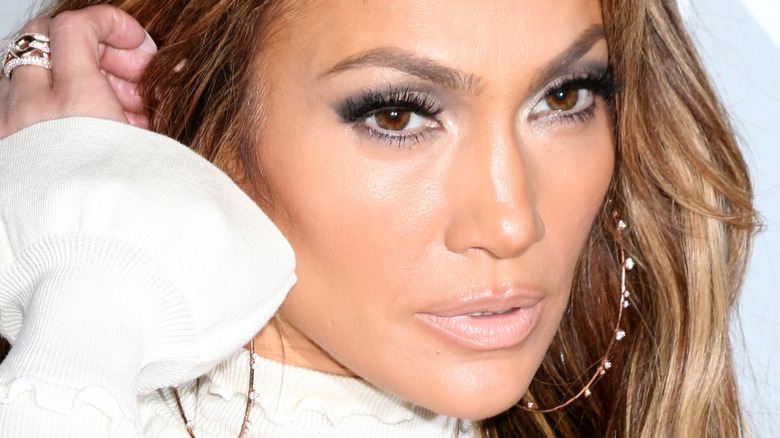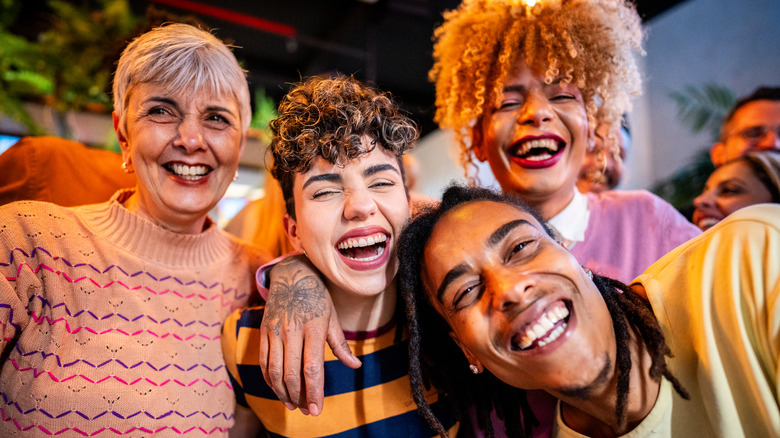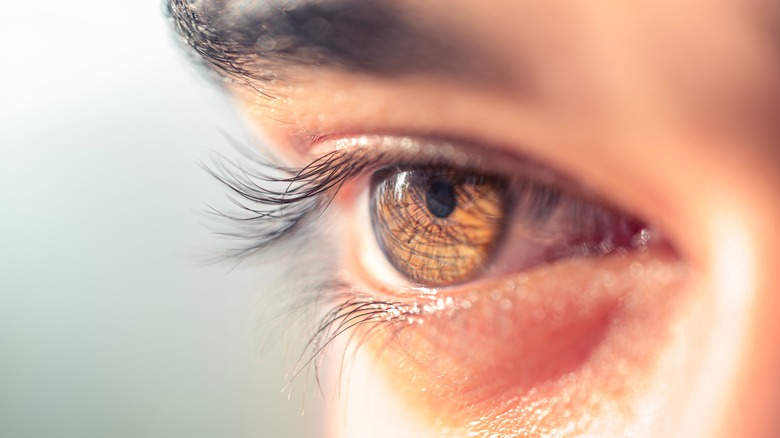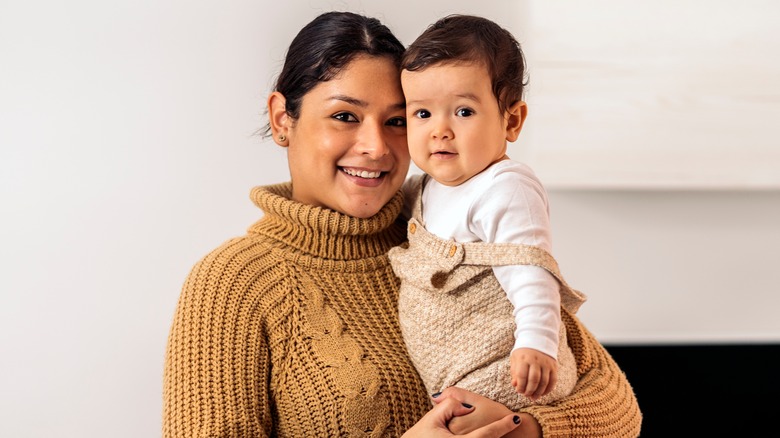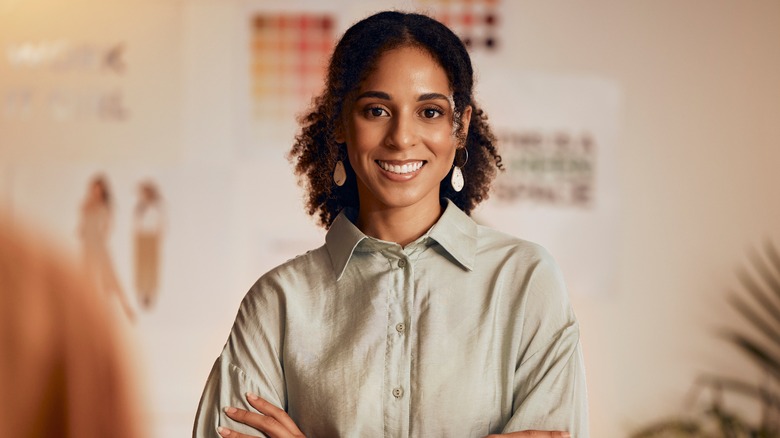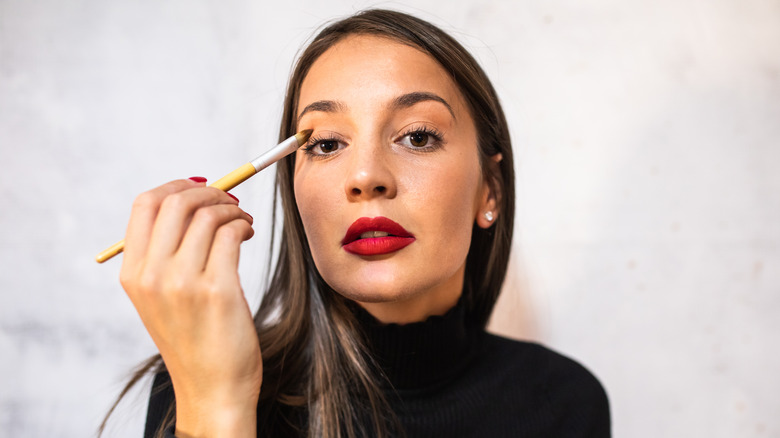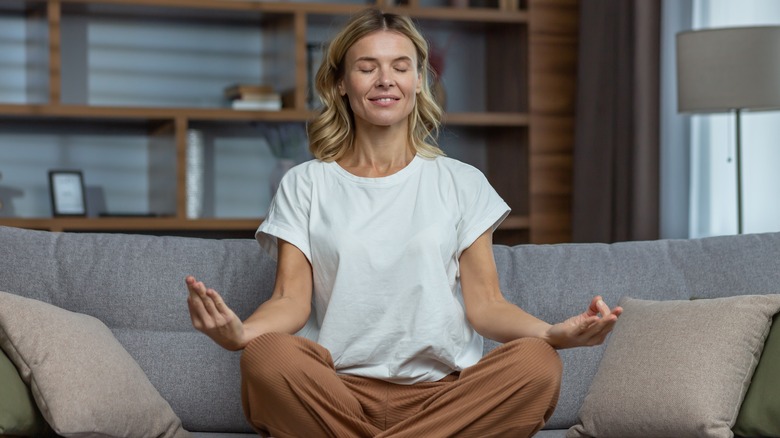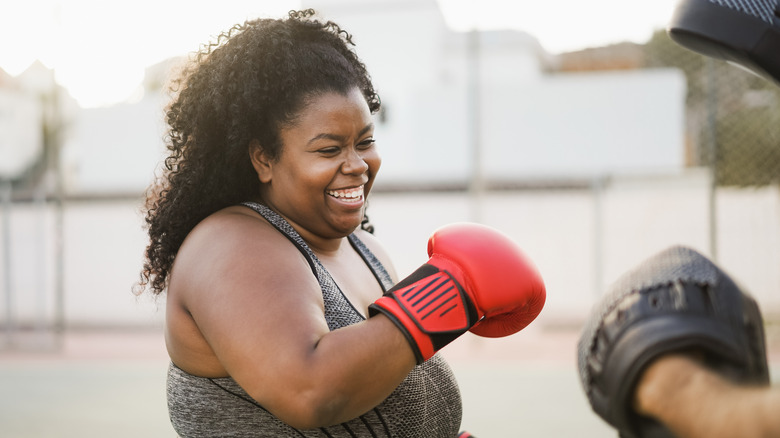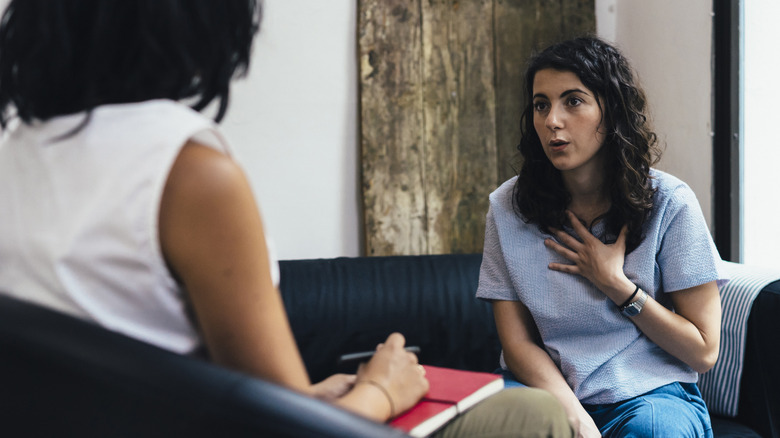Having Brown Eyes Is More Significant Than You Might Think
Do you have brown eyes? Then you're not alone. Some of the most famous and influential people on earth sport darker peepers. From the likes of Oprah Winfrey to Jennifer Lopez, to Ukrainian President Volodymyr Zelenskyy, brown-eyed people are some of the most prominent figures in the world. But does their eye color have anything to do with their success?
The jury's still out on exactly how much our eye color affects other aspects of our lives (and there's always more scientific work to do in this field) but there are some surprising facts about brown-eyes beauties you may not know. Over the years, it's been claimed that eye color can affect everything from health to how good a person is at certain sports. Yep, there really are some interesting brown-eyed factoids out there, because having brown peepers is more significant than you might think! And we're telling you everything you need to know about this stunning eye shade.
More than half the world's population has brown eyes
If you have brown eyes, then you're part of one of the biggest groups in the world. That's because, according to The American Academy of Ophthalmology, more than 50% of the world's population has brown eyes. World Population Review estimates that number is even higher, suggesting somewhere between 70% and 80% of the world's population has brown peepers.
But the shade isn't just the most common color in the world as a whole. Brown is also the most common eye color in the U.S. A 2014 poll by The American Academy of Ophthalmology found that more than 45% of people in the US have brown eyes. And they're far more common than any other color, with the percentage of people in the United States rocking blue eyes trailing behind at 27%.
The percentage of brown-eyed beauties in the U.S. is eclipsed by other countries around the world, though. Uzbekistan is believed to have the largest population percentage of dark-eyed people, with 90.51% of the population of the central Asian country thought to have brown eyes. Sure, they may be common across the globe, but that certainly doesn't make brown-eyed people any less special.
There was once a time everyone on the planet had brown eyes
You may think the global population of those with brown eyes today is big, but there was actually a time when everyone on Earth had brown eyes. That's because, just like our skin, how dark or light a person's eyes are depends on the amount of melanin in the iris (that's the colored ring around the pupil, the black part of the eye).
"Everyone has melanin in the iris of their eye, and the amount that they have determines their eye color," Dr. Gary Heiting, a licensed optometrist, explained to CNN. According to The American Academy of Ophthalmology, there was a time around 10,000 years ago when everyone had such a high amount of melanin in their eyes that every single person on the planet had brown eyes.
That changed due to just one person who experienced a mutation. "A genetic mutation affecting the OCA2 gene in our chromosomes resulted in the creation of a 'switch,'" Professor Hans Eiberg from the University of Copenhagen's Department of Cellular and Molecular Medicine, said to Science Daily. "[That] literally turned off the ability to produce brown eyes." That mutation was then passed down to the next generation, and then the next, and is still going on today in those of us who have lighter eyes. Who knew!?
Brown eyes are considered rare in Iceland, though
Despite brown eyes being the most common color worldwide and the number one eye color in so many countries, there are places where having brown eyes is considered rare. In Iceland, in particular, brown eyes are considered pretty rare, according to The American Academy of Ophthalmology.
As few as 9.22% of the Icelandic population has brown eyes, World Population Review reports, with the most common eye color in the country being blue. In fact, a whopping 74.52% of the population has blue eyes, making brown eyes very much in the minority. But it's not the only place with that kind of divide. Denmark is also low on brown-eyed stunners, as only 14.5% of the population have brown eyes there, while 64.84% have blue.
It all comes back to melanin. Traditionally, it was more likely for people in hotter climates to have darker eyes because of the need for more melanin to help protect them from the sun. People born in cooler countries needed less melanin in their eyes as they were further away from the sun.
No two people in the world have the exact same shade of brown eyes
Despite brown eyes being common all around the world, if you have brown eyes, you're the only person in the world who has your exact shade and makeup. Just like a fingerprint, the exact color and hue of your brown eyes is yours and yours only — because no two eye colors on the planet are exactly the same, according to The American Academy of Ophthalmology. The same can be said of all eye colors because there are just so many different mixtures of tones and shades out there. Whatever your eye color, though, there's a way you can highlight its beauty with your wardrobe.
Though eyes might be classified as brown overall, there are actually countless variations of brown eyes out there. Some people have light brown irises, while others have dark brown eyes that appear almost black. Other people have a shade that's exactly in the middle, and some have brown eyes that lean closer to light or closer to dark with a small amount of other shades mixed in. That's because, according to the Michigan Eye Institute, there are up to 16 genes that can affect the color of our eyes to create a totally unique makeup.
Many people with brown eyes weren't born that way
If you have brown eyes as an adult, that doesn't necessarily mean you were born with them. Fascinatingly, some babies are actually born with blue eyes that then turn brown over time, according to The American Academy of Ophthalmology. That's because melanin develops in the body over time, and usually in infants during their first three years of life. Melanin starts to produce in babies after they turn 1 and continues until they're around 3 years old, meaning babies born with blue eyes can be brown-eyed children.
But, of course, there are plenty of babies born with brown eyes who keep their brown eyes. A 2016 study of newborns found that around two-thirds of the 192 children studied were born with brown eyes, with only one in five of them being born with blue eyes. As noted by All About Vision, babies born with brown eyes are much less likely to have the color change over time due to the melanin already in them.
Those with brown eyes can appear more trustworthy and kind
If you've got brown eyes, you may be perceived as more trustworthy and kind, at least according to studies. Back in 2013, a study set out to determine if our eye color really affects the way people think of us. The study showed 200 students 80 photos of the faces of men and women with either brown or blue eyes. They were then asked to rate how trustworthy they found them. And, it turns out, those studied were more likely to trust those with dark eyes over people with lighter hues in their peepers.
But that's not the end of scientists' discoveries. After swapping the eye colors of those found more trustworthy from dark to light, those conducting the study found similar results on who was seen as trustworthy and who wasn't. Because of that, they determined that it may be facial characteristics associated with brown eyes rather than the eyes themselves. "Brown-eyed individuals tend to be perceived as more trustworthy than blue-eyed ones," the authors of the survey told Scientific American. "But it is not brown eyes that cause this perception. It is the facial morphology linked to brown eyes."
That's not the only project that's been conducted to determine the characteristics of brown-eyed stunners. A survey of 1,000 people conducted in 2022 by 1800 Contacts asked respondents to name the personality traits they believed brown-eyed people to have. Amongst the answers? Being kind, reliable, and patient.
Brown eyes can handle a wide array of eyeshadow shades
The significance of having brown eyes isn't all scientific, though. There are some fun aspects to it, too ... like makeup! While people with lighter eyes may have to be more selective with eye shadow that compliments their eye color, brown-eyed people don't exactly have the same problem. That's because almost any shadow shade can suit brown eyes.
"Brown eyes can really take any color shadow, it's just about making sure the tones also complements the skin," Chanel makeup artist Pati Dubroff told InStyle. That's a sentiment Opeyemi Adeyemo, the co-founder of OPV Beauty, agreed with. "Brown eyes can pull off any shade," she said while speaking to Women & Home.
But while those with dark eyes pretty much have their pick of the makeup counter, there are still a few tips to note when it comes to getting makeup shades right. Adeyemo noted that those with darker brown eyes should avoid going too dark with their shadow to keep the lid more visible. Hardly anything is off-limits here, but there are a few eyeshadow colors that will really compliment brown peepers. "[Use] a cool eyeshadow palette to create drama – so blue, green or yellow eyeshadow would all look amazing on brown eyes," Adeyemo shared.
People with brown eyes can be less susceptible to certain illnesses -- but more susceptible to others
Did you know that there are actually some health benefits linked with having brown eyes? According to The American Academy of Ophthalmology, people with brown eyes may find themselves less likely to be diagnosed with eye cancer, macular degeneration, and diabetic retinopathy when compared to people with lighter eyes (such as those with blue or green eyes).
Though there's still more research to be done on why that's the case, it's believed that the extra melanin in brown eyes offers more protection, similar to the way melanin in the skin can offer more protection from the sun's UV rays. Of course, having brown eyes won't stop illnesses developing, so it's never a bad idea to take every precaution to protect your eyes.
It's not all good news on the health front. While brown-eyed people may have less of a chance of being diagnosed with some illnesses, that's not the case for everything. A study conducted in 2000 found that people with brown eyes are more likely to develop cataracts, and noted that they should take extra precautions when it comes to being outside in direct sunlight. Ten years earlier, a 1990 study found that anyone with brown eyes may be one-and-a-half times more likely to develop hypertension than those with light eyes, which is a condition that affects the arteries.
Dark-eyed people may be better at reactive sports
Did you know that people with brown eyes may be better at certain sports? Really. The claim is based on a study conducted in 1992, which looked into the link between eye color and reactive motor performance. Researchers discovered that people with dark eyes appeared to have quicker reaction times, which may make them better at sports that need a quick and accurate reaction — like boxing, hitting a ball, or playing defense in football.
Of course, there are always exceptions, but some of the most successful athletes out there have brown eyes, including Mike Tyson, Serena Williams, and Babe Ruth. In comparison, the study found that people with lighter eyes were better at sports that didn't need such a quick reaction time. Therefore, people with light eyes, such as blue or green hues, appeared to be better at sports like bowling, golfing, and pitching in baseball rather than hitting.
The theory was also found to have merit back in 1976, when a study tested the reflexes of a group of people with dark eyes compared to people with light eyes. The study conducted a number of tests and found that brown-eyed people reacted quicker than blue-eyed people.
Dark-eyed people may also have more success with certain types of behavior therapy (when they're younger, at least)
Health and sports pros aren't the only benefits that can come with having brown eyes. In addition to brown eyes being linked to certain health benefits, it's also been claimed that people with dark eyes may have a better success rate when it comes to certain behavior therapies.
A 1984 study set out to find out how people with different colored eyes reacted to different types of therapy and which ones helped them the most. It discovered that the hue of our eyes may actually determine what kind of therapy we're most likely to react well to. According to the research, children and teenagers with dark eyes tended to respond better to reactive treatment programs than people with lighter eyes. As for those with light eyes? It found that they reacted better to treatments that were self-paced.
Of course, it's worth noting that the study is a good few years old now, so needs to be taken with a grain of salt. There's also a lot more work to be done on the correlation between eye color and behavior therapy techniques, as therapy has moved on a lot since the study was conducted.
